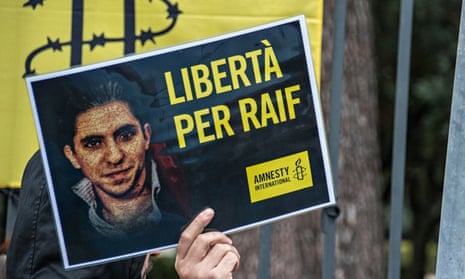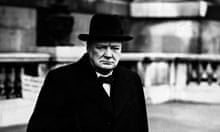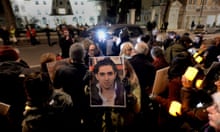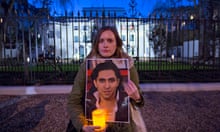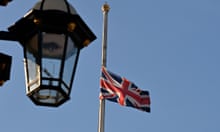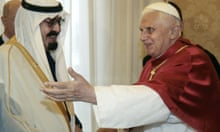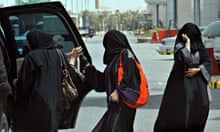The reverential reaction from western leaders to the news of King Abdullah’s death and the expected procession of top dignitaries to pay condolences in Riyadh serve as a reminder that Saudi Arabia, with its abundant wealth and geopolitical influence, is a perpetual exception to the west’s emphasis on human rights.
The outpouring of praise for the king focused on his status as a relative liberal within the Saudi context, especially on women’s issues. But the recent public flogging of a liberal blogger and the video of the beheading of a woman with a sword have offered snapshots of one of the harsher human rights regimes in the world.
“King Abdullah’s reign brought about marginal advances for women but failed to secure the fundamental rights of Saudi citizens to free expression, association, and assembly,” Human Rights Watch said. The group said that since 2011, the regime has grown even harsher as it has attempted to stifle online criticism “through intimidation, arrests, prosecutions, and lengthy prison sentences”.
Raif Badawi, the blogger sentenced to 1,000 lashes, to be meted out 50 at a time, was punished simply for running a liberal website dedicated to freedom of speech. The execution video, leaked last week by activists, was an example of a widespread practice. Over 80 people were executed in 2014, mostly by beheading, a practice that has triggered global revulsion when used in recent months by Islamic State extremists.
None of these issues has dampened western courtship of Riyadh, or the response to the king’s passing. Flags were put at half-mast at official buildings across London on Friday, in a move the UK’s Department for Culture said was in line with protocol following the death of a foreign monarch. And the British royal family will dispatch Prince Charles to pay respects in person.
Human rights advocates see some irony in his attendance, as he has been outspoken in recent months on the persecution of Christians in the Middle East, but he will be paying his respects to a regime where Christians are banned from practising their faith openly, there are no churches despite the presence of an estimated 1 million Roman Catholics, mostly foreign workers, and where some have been detained for worshipping in their own homes.
However, in the west’s complex relations with Riyadh, there have always been other priorities. The tributes to Abdullah have stressed the stability of his rule, which has become all the more vital with the spread of violent chaos across the Middle East and north Africa after the largely abortive Arab spring.
“As a leader, he was always candid and had the courage of his convictions … One of those convictions was his steadfast and passionate belief in the importance of the US-Saudi relationship as a force for stability and security in the Middle East and beyond,” President Barack Obama said in a statement on Friday.
“This is a sad day,” the US secretary of state, John Kerry, added. “The United States has lost a friend, and the Kingdom of Saudi Arabia, the Middle East, and the world has lost a revered leader.”
Washington had looked to King Abdullah to rein in Islamic extremism at home and abroad, and to provide a counterweight to Iran’s growing aspirations to wield influence in the Gulf. However, the Saudi monarchy’s deep distrust of Tehran had increasingly become an irritant in relations with the Obama administration as it seeks to seal a deal with Iran on its nuclear programme.
The close alliance with the kingdom also evokes mixed feelings in American domestic opinion, especially among Christian activist groups. Obama came under heavy fire from the conservative press in 2009 when he was photographed apparently stooping in front of the Abdullah. The White House insisted the president was just stretching to shake the monarch’s hand.
Europe has been just as reticent as the UK and the US in complaining about the poor Saudi human rights record, and its leaders have joined in the chorus of appreciation for the king. Pierre Moscovici, the European Union’s commissioner for economic and financial affairs, described him as “a personality of peace and strong leadership”.
Christian Lagarde, the French head of the International Monetary Fund, went as far as praising Abdullah as a feminist. “In a very discreet way, he was a strong advocate of women. It was very gradual, appropriately so probably for the country. I discussed that issue with him several times and he was a strong believer,” she said during the Davos economic forum in Switzerland.
European relations with Saudi Arabia are particularly affected by commercial concerns. France and the UK especially have vied to sign huge arms contracts with their biggest Gulf ally.
“There is always a consensual rather than a confrontational approach on human rights,” said Julien Barnes-Dacey, a senior policy fellow at the European Council on Foreign Relations. “The Saudis are too important economically and politically. Financial concerns are key. They are a pivotal regional player. If you push too hard you will find yourself out of the loop at a time when the British and European role in the region has question marks over it.”
